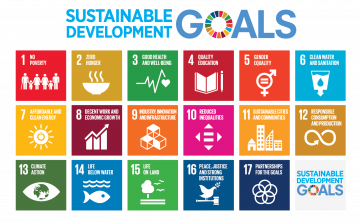The impacts of COVID-19 on global, national, and local systems and citizens have presented challenges with regards to progress towards the 2030 Sustainable Development Goals (SDGs).
At a national level, Canada’s contributions have been highlighted in the recently published 2030 Agenda National Strategy “Moving Forward Together”. The National Strategy report includes a summary of the objectives and progress since the June 2019 consultations and associated interim document (“Towards Canada’s 2030 Agenda National Strategy“), setting both a “whole of society vision” and “core objectives for engagement and action” to accelerate our national progress.
Data associated with our national indicators and targets are available through the Data Hub hosted by Statistics Canada as well as the preliminary iteration of the Canadian Indicator Framework platform. The SDG team also produced a series of factsheets in October 2020 to overview current data available for progress on each of the goals (though due to both time delays in data and the ongoing nature of the pandemic, many impacts resulting from COVID-19 were not able to be captured and will require further review of subsequent reports):
- No Poverty (Oct 2020)
- Zero Hunger (Oct 2020)
- Good Health and Well-Being (Oct 2020)
- Quality Education (Oct 2020)
- Gender Equality (Oct 2020)
- Clean Water and Sanitation (Oct 2020)
- Affordable and Clean Energy (Oct 2020)
- Decent Work and Economic Growth (Oct 2020)
- Industry, Innovation and Infrastructure (Oct 2020)
- Reduced Inequalities (Oct 2020)
- Sustainable Cities and Communities (Oct 2020)
- Responsible Consumption and Production (Oct 2020)
- Climate Action (Oct 2020)
- Life below Water (Oct 2020)
- Life on Land (Oct 2020)
- Peace, Justice and Strong Institutions (Oct 2020)
- Partnerships for the Goals (Oct 2020)
Moving forward, it will be incumbent on global bodies, national and local governments, and individual citizens to consider their own role in reaching the SDG targets by 2030.
In July of last year, the United Nations Department of the Economic and Social Affairs published a special issue of their Sustainable Development Outlook, “Achieving SDGs in the wake of COVID-19: Scenarios for policymakers“, which drew three main conclusions (p.5):
- First, while the impact of the crisis has been unprecedented in its scope and scale, it has not affected all countries and all people in the same way, and the setbacks caused by COVID-19 need not be permanent. It is quite possible to regain the momentum and move ahead towards the SDGs
- Second, it is even possible to convert the crisis into an opportunity for recovering better. This can be done by gearing policy interventions toward the strengthening of human and planetary resilience, and directing much of the resources earmarked for recovery toward investment in promoting the Goals. This crisis has highlighted many of the weaknesses of our socioeconomic structures and of the existing policy frameworks, but it has also demonstrated that governments and other stakeholders are capable of unprecedented and determined action when necessary.
- Third, the impact of COVID-19 has varied across the SDGs. While its impact for many prosperity-related SDGs was negative, its impact for many planet-related SDGs has been positive: greenhouse gas emissions declined; air and water quality improved; and a process of regeneration of the nature could be witnessed in many areas. These opposite impacts of COVID-19 demonstrate yet again that the current ways of achieving prosperity are in conflict with the health of the planet. The upheavals caused by the COVID-19 crisis therefore create the opportunity for recognizing this conflict in a more profound way and for putting in more energetic efforts during the Decade of Action to reach the SDGs by 2030.
UN DESA likewise sees some opportunities presented by COVID-19 (p.16):
“… the emergency response measures put in place, though they vary in size and scope, have demonstrated the commitment of governments to respond to this crisis with the necessary determination. A similar degree of determination in directing the crisis response towards a better recovery would allow societies to rectify some of the deficiencies in policy that have hindered progress toward the SDGs. With the ambition to build back better, it may now be possible also to address issues that previously would have seemed too controversial or politically difficult.”

